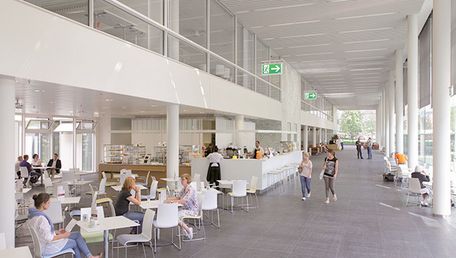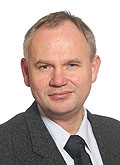Emphases
Key diagnostic areas
- Entire field of clinical chemistry and hematology
- Osteometabolic disorders
- Tumor diseases
- Genetic metabolic disorders
- Clinical toxicology and trace element analysis
- Urine and nephrological diagnostics
Key research areas
- Quality management in medical laboratories
- Laboratory diagnostics of renal diseases
- Beta adrenergic signal transduction
- Chromatine structure and cell core architecture
- Non-viral gene transfer
The Institute for Clinical Chemistry and Laboratory Diagnostics is responsible for the central diagnostic laboratory and provides diagnostic laboratory analyses for all patients of the university hospital. As such, it is involved in numerous clinical studies and the development of new analytical approaches to prevention, diagnosis and therapy of diseases. The analytical spectrum of the institute comprises routine clinical chemistry, immunology, haematology as well as specialties including high pressure liquid chromatography, capillary electrophoresis, atomic absorption spectroscopy, and molecular genetics.
Diagnostic laboratory analyses amounting to 3 million per year are requested from the institute either by direct electronic communication with the laboratory information system (order at entry) or via normalised forms processed in an automated manner. This, in concert with automated handling and distribution of clinical specimen and electronic delivery of analytical results to the hospital wards has significantly reduced the overall turn-around-time of laboratory diagnostics for most units of the university hospital. Moreover, for time sensitive analyses and STAT-specimen, a dedicated analytical unit is provided, which is open throughout the year for 24h per day.
In addition to its routine duties, the institute harbours basic research groups, which are dedicated to research of molecular mechanisms of aging, the molecular basis of cardiovascular function and disease, environmental mechanisms of pathogenesis, and the biology of stem cells derived form human umbilical blood. These are embedded in corresponding cooperative research initiatives of the Heinrich-Heine-University.
Research and Educational Duties
In the field of routine laboratory diagnostics, research is focussed on kidney diseases. A more basic research interest lies in cell biology, most notably beta-adrenergic signal transduction and the role played by nuclear architecture and chromatin structure in the stability of the nuclear and mitochondrial genome. With these research foci, the institute is embedded in various cooperative research endeavours of the Heinrich-Heine-University, including collaborative research centres SFB 612 and SFB 503 and research training groups GRK 1033 and GRK 1089.
The institute attends to various educational duties. It is crucially involved in coordinating the interdisciplinary education of medical students during the second and third study year. It has the authorization to confer specialty training (laboratory medicine) to medical doctors. It is a centre of quality management and provides educational support on this field in a regular manner. It is involved in the education of medical laboratory technicians (MTA). In the context of research training groups GRK 1033 and GRK 1089, it is engaged in the promotion of elite doctoral students of medicine and science.
Curriculum Vitea of Prof. Dr. Friedrich Boege
| 1978-1985: | Study of Medicine at University of Wuerzburg, Medical School |
|---|---|
| June 1985: | Passing final Medical Examination at University of Wuerzburg, Medical School. Approbation as physician |
| 1981-1983: | Doctoral Student at Max-Planck-Institut für Biophysik, Frankfurt/M. (educational stipend of the MPG) Supervisor: Prof. Dr. K.J. Ullrich |
| 1985-1987: | Doctoral and postdoctoral fellow at the Dept. Physiol. Chemistry, Univ. of Wuerzburg, Medical School (educational stipend of the Fritz-Thyssen-Foundation). Supervisor: Prof. E.J.M. Helmreich |
| 1987: | Promotion to doctor of medicine (MD) Grade: summa cum laude |
| 1987-2000: | Head of the Dept. of Clin. Chemistry and Laboratory Medicine. at Medizinischen Poliklinik, Univ. of Würzburg, Medical School |
| 1993: | Specialty degree (Facharzt) in Laboratory Medicine |
| 1995: | Habilitation (Dr. med. habil.) in Laboratory Medicine and Clinical Biochemistry |
| 1996-1997: | Visisting professor of the Dept. Mol. Biology, University of Aarhus (DK) (Travel stipend of the German Cancer Research Foundation) |
| 1997-2002: | Lecturer (Privatdozent) of the University of Würzburg, Med. School |
| Since 2002: | Full Professor of Clincal Chemistry and Laboratory Medicine and Director of the Institute of Clinical Chemistry and Laboratory Diagnostics at the Heinrich-Heine-University, Medical School, Düsseldorf |
Further information
Visit us at Zentralinstitut für Klinische Chemie und Laboratoriumsdiagnostik





